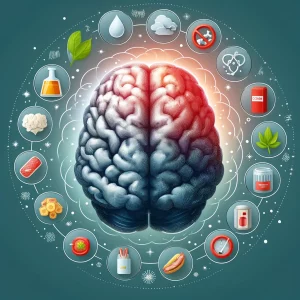Dementia is a debilitating condition that affects millions of people worldwide. It is a progressive disease that leads to the deterioration of brain cells, resulting in reduced cognitive function and, eventually, a complete loss of independence. Early detection of dementia is crucial because once the disease has fully manifested, it is irreversible. However, recognizing the early, often silent, warning signs can help in slowing down the progression of the disease. This comprehensive news report will delve into the ten silent warning signs of dementia, the factors contributing to brain degeneration, and strategies for prevention.
Understanding Dementia
Dementia is not a single disease but a general term that encompasses various conditions characterized by cognitive decline. Alzheimer’s disease is the most common form of dementia, accounting for 60-80% of cases. Other types include vascular dementia, dementia with Lewy bodies, and frontotemporal dementia. These conditions primarily affect older adults, but they are not a normal part of aging.
The Brain’s Role in Dementia
The brain is a complex organ that controls every function in the body. It is responsible for processing information, making decisions, and coordinating movements. When brain cells degenerate, these functions are impaired. The brain’s ability to process and send signals diminishes, much like a light bulb losing its brightness over time. Initially, the decline in brain function may be subtle, but as more neurons die, the symptoms become more apparent and debilitating.

Key Factors Influencing Dementia
Genetic Factors
Genetics play a significant role in the risk of developing dementia. Certain genes, such as the APOE-e4 gene, have been linked to a higher risk of Alzheimer’s disease. However, having these genes does not guarantee that an individual will develop dementia. Instead, it increases their susceptibility. It is essential to differentiate between genetic makeup (which is fixed) and genetic expression (which can be influenced by lifestyle factors).
Environmental Toxins and Oxidative Stress
Environmental toxins, such as heavy metals and pesticides, can damage brain cells and contribute to cognitive decline. Additionally, oxidative stress—caused by an imbalance between free radicals and antioxidants in the body—can accelerate brain degeneration. Smoking, processed foods, and excessive sugar intake can increase oxidative stress.
Chronic Inflammation
Chronic inflammation has been linked to various health conditions, including dementia. Inflammation can damage blood vessels in the brain, reducing the flow of oxygen and nutrients needed for healthy brain function. Conditions such as obesity, diabetes, and autoimmune diseases can contribute to chronic inflammation.

The Ten Silent Warning Signs of Dementia
- Changes in Special Senses
One of the earliest signs of dementia is a change in special senses, particularly smell. Difficulty distinguishing between different smells or a dull sense of taste can indicate brain degeneration. Vision changes, such as a lack of depth perception or reduced peripheral vision, can also be early warning signs. These changes result from the brain’s decreased ability to process sensory information.
- Motor Function Issues
Motor function issues can manifest as changes in posture, gait, and balance. A hunched or stooped posture, shorter steps, or asymmetrical arm swing while walking can indicate brain degeneration. Practicing good posture and maintaining physical activity can help mitigate these issues. Additionally, balance problems, clumsiness, or frequent falls are significant indicators.
- Handwriting Changes
Changes in handwriting, such as becoming more sloppy or the development of micrographia (tiny handwriting), can be an early sign of dementia. This is particularly associated with Parkinson’s disease but can also indicate general cognitive decline. The loss of fine motor control and coordination reflects underlying brain degeneration.
- Speech Changes
Subtle changes in speech, such as a weaker or softer voice, slurring of words, or hesitation while speaking, can indicate brain degeneration. These changes occur because the brain is responsible for controlling speech and coordinating the muscles involved in speaking. A decline in cognitive function can lead to difficulties in finding the right words or forming coherent sentences.
- Difficulty Swallowing
Swallowing is a complex process controlled by the brain. Difficulty swallowing, in the absence of a sore throat or other physical cause, can be a neurological issue. This symptom is significant because it indicates that the brain’s ability to coordinate the muscles involved in swallowing is impaired.
- Tremors
Mild, temporary shaking or tremors, especially at rest, can be an early sign of brain degeneration. These tremors are often noticed in the hands and fingers and can occur without any physical exertion. Temporary eyelid twitching, or blepharospasm, can also be a sign of neurological imbalance.
- Less Stamina
Reduced physical and mental endurance can be indicative of dementia. This includes a decline in the ability to focus and complete tasks. The brain drives both physical and cognitive activities, so a decrease in stamina can reflect underlying cognitive decline.
- Decreased Reflexes
Slower reaction times and decreased reflexes can be early signs of dementia. This includes slower responses to visual or auditory cues. The brain’s ability to process and react to stimuli diminishes as cognitive function declines.
- Spatial Confusion
Difficulty navigating familiar areas or recognizing familiar environments can be a warning sign of dementia. Spatial confusion can also occur in well-known rooms or locations. This symptom reflects the brain’s impaired ability to process spatial information.
- Change in Emotional Affect
A change in emotional expression, known as flat affect, can indicate early brain degeneration. This includes less vocal intonation and facial expression. In later stages of dementia, individuals may exhibit exaggerated expressions or spontaneous outbursts due to the brain’s inability to inhibit certain behaviors.

Strategies for Prevention
While there is no cure for dementia, certain lifestyle changes can help slow down the progression of the disease and improve brain health.
Healthy Lifestyle
Maintaining a healthy lifestyle is crucial for brain health. This includes a balanced diet rich in antioxidants, regular physical exercise, and adequate sleep. Foods that are high in antioxidants, such as berries, nuts, and leafy greens, can help reduce oxidative stress. Physical exercise increases blood flow to the brain and promotes the growth of new brain cells.
Stress Management
Chronic stress can contribute to cognitive decline. Practicing stress management techniques, such as mindfulness, meditation, and deep breathing exercises, can help reduce stress levels and protect brain health.
Continuous Learning
Engaging in activities that stimulate the brain can help maintain cognitive functions. This includes reading, puzzles, learning new skills, and social interactions. Keeping the brain active and challenged can help build cognitive reserve and delay the onset of dementia.
Regular Health Check-Ups
Regular health check-ups can help detect early signs of cognitive decline. Early intervention and treatment can help manage symptoms and slow down the progression of dementia.
Avoiding Environmental Toxins
Reducing exposure to environmental toxins can help protect brain health. This includes avoiding smoking, reducing the intake of processed foods, and limiting exposure to pesticides and heavy metals.
Dementia is a complex and progressive condition that affects millions of people worldwide. Recognizing the early, often silent, warning signs can help in slowing down the progression of the disease and improving the quality of life for those affected. By understanding the factors contributing to brain degeneration and adopting healthy lifestyle habits, individuals can take proactive steps to protect their brain health.
It is essential to remain vigilant and seek medical advice if any of these warning signs are noticed. Early detection and intervention can make a significant difference in managing the symptoms of dementia and maintaining cognitive function. As research continues to advance, there is hope that more effective treatments and preventive measures will become available, providing a brighter future for those at risk of developing dementia.
